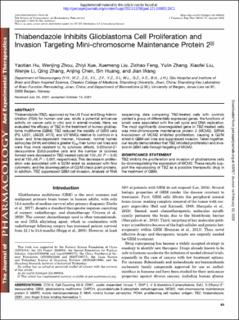Thiabendazole Inhibits Glioblastoma Cell Proliferation and Invasion Targeting Mini-chromosome Maintenance Protein 2
Hu, Yaotian; Zhou, Wenjing; Xue, Zhiyi; Liu, Xuemeng; Feng, Zichao; Zhang, Yulin; Liu, Xiaofei; Li, Wenjie; Zhang, Qing; Chen, Anjing; Huang, Bin; Wang, Jian
Journal article, Peer reviewed
Published version

Åpne
Permanent lenke
https://hdl.handle.net/11250/3058771Utgivelsesdato
2022Metadata
Vis full innførselSamlinger
- Department of Biomedicine [710]
- Registrations from Cristin [9791]
Originalversjon
Journal of Pharmacology and Experimental Therapeutics. 2022, 380 (1), 63-75. 10.1124/JPET.121.000852Sammendrag
Thiabendazole (TBZ), approved by the US Food and Drug Administration (FDA) for human oral use, elicits a potential anticancer activity on cancer cells in vitro and in animal models. Here, we evaluated the efficacy of TBZ in the treatment of human glioblastoma multiforme (GBM). TBZ reduced the viability of GBM cells (P3, U251, LN229, A172, and U118MG) relative to controls in a dose- and time-dependent manner. However, normal human astrocytes (NHA) exhibited a greater IC50 than tumor cell lines and were thus more resistant to its cytotoxic effects. 5-Ethynyl-2′-deoxyuridine (EdU)-positive cells and the number of colonies formed were decreased in TBZ-treated cells (at 150 μM, P < 0.05 and at 150 μM, P < 0.001, respectively). This decrease in proliferation was associated with a G2/M arrest as assessed with flow cytometry, and the downregulation of G2/M check point proteins. In addition, TBZ suppressed GBM cell invasion. Analysis of RNA sequencing data comparing TBZ-treated cells with controls yielded a group of differentially expressed genes, the functions of which were associated with the cell cycle and DNA replication. The most significantly downregulated gene in TBZ-treated cells was mini-chromosome maintenance protein 2 (MCM2). SiRNA knockdown of MCM2 inhibited proliferation, causing a G2/M arrest in GBM cell lines and suppressed invasion. Taken together, our results demonstrated that TBZ inhibited proliferation and invasion in GBM cells through targeting of MCM2.
